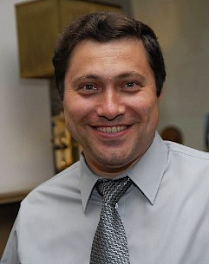 puts CNN, FOX NEWS, CBS, ABC, and NBC as the most watched TV channels in New York City. But the reality is different. Overwhelmingly, immigrants prefer and trust their ethnic community newspapers, radio, and TV stations over mainstream major media outlets.
puts CNN, FOX NEWS, CBS, ABC, and NBC as the most watched TV channels in New York City. But the reality is different. Overwhelmingly, immigrants prefer and trust their ethnic community newspapers, radio, and TV stations over mainstream major media outlets.Readers of Vecherniy New York (Russian Language Weekly), Nowy Dziennik (Polish Daily News), World Journal (Chinese Daily), El Diario (Spanish Daily), Irish Echo (Weekly) receive most of their information about the city, state, and country as well as news about the world from their favorite ethnic newspapers. Why? Because they know their editors and reporters; because they recognize their relatives, friends, and neighbors on the photos in these publications and because they find there the point of view closer to them. People who work for these immigrant newspapers followed the same paths, faced similar challenges in adapting for new conditions -- just like their readers. People who work for ethnic radio and TV st
 ations know the mentality, traditions, and habits of their audiences much more than even the best journalists of the National Public Radio, or CNN. That is why, immigrants often feel ostracized by the mainstream media that usually focuses on the stories about the Russian Mafia, Chinese illegal immigrants, or Hispanic high school dropouts and the like.
ations know the mentality, traditions, and habits of their audiences much more than even the best journalists of the National Public Radio, or CNN. That is why, immigrants often feel ostracized by the mainstream media that usually focuses on the stories about the Russian Mafia, Chinese illegal immigrants, or Hispanic high school dropouts and the like.So, I feel proud to be one of the first members of the Steering Committee of the Independent Press Association of New York (IPA-NY), which for the first time united more than 150 ethnic and community newspapers all over the city. Today, NYCMA (New York Community Media Alliance), formerly IPA-NY, provides crucial assistance and support to this important, but often ignored, part of the media market. It's hard to underestimate the tremendous power of NYCMA. It organizes the annual IPPIES Awards ceremonies, where the best reporters from various ethnic & community media receive prizes for their journalistic achievements. NYCMA also provides technical support, places ads through its advertising service, translates the most valuable stories from many foreign languages and publishes them on its online digest, "Voices That Must Be Heard". In the last several years, NYCMA organized seminars, workshops, journalistic retreats, and fellowships.
 For example, this year eighteen journalists from ethnic & community newspapers participate in the Fellowship Program (Educational Beat), where they meet representatives from the Department of Education and teachers union, high school principals, educators, advocates for children and parents. All fellows write stories about educational issues in their respective
For example, this year eighteen journalists from ethnic & community newspapers participate in the Fellowship Program (Educational Beat), where they meet representatives from the Department of Education and teachers union, high school principals, educators, advocates for children and parents. All fellows write stories about educational issues in their respective communities. Usually, underpaid immigrant reporters receive $600 monthly stipend for 10 months of participation in this fellowship. But the most important achievement of NYCMA is the creation of the "Feel Good Community" of journalists from all communities of our great city. Last year, thanks to NYCMA, many of us banded together and covered the US Presidential primaries and national party conventions. It was truly a remarkable experience to meet and cover Barack Obama, Hillary Clinton, Rudy Giuliani, John McCain, Mitt Romney, and other presidential hopefuls. Besides, our journalistic friendship helped our communities to understand each other much better than before.
communities. Usually, underpaid immigrant reporters receive $600 monthly stipend for 10 months of participation in this fellowship. But the most important achievement of NYCMA is the creation of the "Feel Good Community" of journalists from all communities of our great city. Last year, thanks to NYCMA, many of us banded together and covered the US Presidential primaries and national party conventions. It was truly a remarkable experience to meet and cover Barack Obama, Hillary Clinton, Rudy Giuliani, John McCain, Mitt Romney, and other presidential hopefuls. Besides, our journalistic friendship helped our communities to understand each other much better than before.
On my own initiative, I started to invite ethnic reporters to be guests on my weekly TV show on RTN. Recently, I interviewed Luna Liu from the World Journal. We talked about the growing power of the Chinese community, the celebration of the Chinese New Year, and the similarities between Russian and Chinese parents (we both want to see our children get the best education).
I believe that NYCMA has a great future. Even in these tough economic times, non-for-profit foundations are eager to support an organization which reflects the diversity of New York and represents the views of almost half of the city's population.









